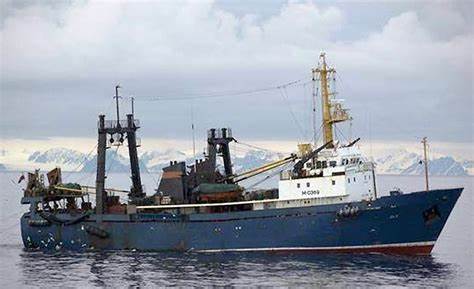News
Japan and Russia agree to terms of 2023 fisheries-access agreement

Japan and Russia have agreed to reduce the total allowable catch in each other’s fishing areas by 33 percent after the 39th meeting of the Japan-Russia Fisheries Committee.
Japan and Russia have a longstanding agreement to allow reciprocal fishing access to areas of each other’s exclusive economic zones (EEZs). The Japan-Russia Fisheries Committee was established based on the Soviet-Japanese Agreement on Offshore Fisheries, which came into effect in 1984.
Japan’s Fishery Agency announced the results of the meeting – held via web conference – on 27 December, 2022.
As a result of the discussions, in 2023, Russian vessels fishing in Japan’s EEZ will have a TAC of 50,000 metric tons (MT), down from 75,000 MT in 2022. By major fish types, the quotas are: 40,000 MT for mackerel, down from 45,000 MT last year; 8,000 MT for sardines, down from 20,000 MT; and 2,000 MT for longfin codling (Laemonema longipes), down from 10,000 MT. A total of 89 Russian vessels, the same as in the previous year, will be allowed to fish in Japan’s EEZ.
The Russian vessels are large freezer-trawlers with gross tonnage of about 4,000 to 8,000 MT, equipped with processing and refrigeration facilities. The waters Japan has granted them access to are on the Pacific Ocean side from Hokkaido to the Sanriku and Joban regions (Northeastern Honshu Island).
Japanese vessels fishing in Russia’s EEZ will also have a TAC of 50,000 MT, down from 75,000 MT. By species, the TAC is 31,824 MT for Pacific saury, down from 56,424 MT; 5,619 MT for Japanese flying squid, unchanged from 2022; and 3,200 MT for Pacific cod, up from 1,600 MT. The total number of Japanese fishing vessels allowed into Russia’s EEZ will be unchanged at 585.
Japan will operate bottom longline fishing vessels off the Pacific side of the disputed Iturup Island (called Etorofu in Japanese), and will operate saury stick-seine fishing boats farther out to sea. Japanese squid-jiggers will operate in Russian waters in the Sea of Japan to the east, and north of Vladivostok. In addition to the reciprocal access, Japan will pay approximately JPY 26.94 million (USD 201,349, EUR 191,139), the same as in 2022, for an additional quota of 694.66 MT of Pacific cod.
In addition to setting quotas, the committee introduced new regulations governing the operations of Russian vessels. Russian fishing vessels targeting mackerel and sardines will be prohibited from the entire Japanese EEZ from 16 March to 14 November, 2023.
Russian fishing vessels will also be prohibited from operating in waters within 15 miles of the coast of Japan's Ibaraki Prefecture. All Russian fishing vessels are required to keep a distance of at least two miles from Japanese fishing vessels, when possible. Further, the number of vessels allowed to enter the area off Ibaraki Prefecture at the same time will be reduced to five from six in the previous year.
The measures specific to Ibaraki Prefecture may be in response to proposals the prefectural government put forward to the Japan's Fisheries Agency last year. Specifically, the Ibaraki Prefectural government proposed the establishment of a contact system to avoid damage to the fishing gear of shore-based fishermen. They also requested that when Russian ships damage fishing gear, full compensation for the cost of restoring the damaged fishing gear be paid, regardless of whether the offending vessel is identified or not.
In October 2022, Japan's Fisheries Agency said it would ask Japanese fishermen to inform Russian fishermen of the location of their fishing gear on a quarterly basis. The agency also said Russia has pledged to instruct its fishing vessels to operate with particular caution in areas where they have been notified that gear is present.
“As for damage to fishing gear caused by foreign fishing vessels, we have been working on a project for countermeasures against foreign fishing vessels, such as South Korean and Chinese fishing vessels,” the Fisheries Agency said. “In the case of damage to fishing gear caused by foreign fishing vessels, the government provides support for expenses necessary to restore damaged fishing gear to its original condition under the Foreign Fishing Vessels Operation Countermeasures Program, which includes South Korea and China. As for damage to fishing equipment caused by Russian trawlers, the government will provide half of the necessary expenses for restoring the equipment to its original condition, as it did for the previous project.”
In the fiscal year 2023 supplementary budget, the government allocated JPY 2.5 billion (USD 18.7 million, EUR 17.7 million) to the Foreign Fishing Vessels Operation Countermeasures Program. Much of this will be used for retrieval and disposal of abandoned gear and boats. The money is routed from the government to the Japan-Korea/Japan-China Agreement Measures Fisheries Promotion Foundation, and from there to the local fishery cooperatives concerned.
Categories
Contact Us
Contact: Yang Lee
Phone: +86 18765203281
Tel: +86 18765203281
Add: No.435, Lanzhou East Road, Jiaozhou, Qingdao, China 266000